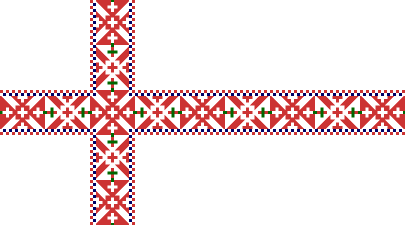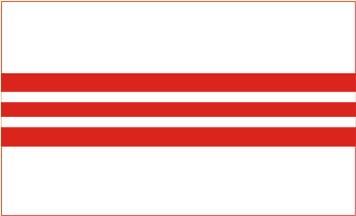 zachary harden
zachary harden
Keywords: estonia | seto |
Links: FOTW homepage | search | disclaimer and copyright | write us | mirrors

Last modified: 2023-06-03 by  zachary harden
zachary harden
Keywords: estonia | seto |
Links: FOTW homepage |
search |
disclaimer and copyright |
write us |
mirrors

image by Le Thanh-Tam, 12 August 2006
See also:
You can see this flag at <www.eurominority.org>
and <www.setomaa.ee>.
Le Thanh-Tam, 12 August 2006
Here is a photo
which appeared on the cover of "Columbia College Today"
March/April 2008 issue. The cover photo and story were about
Toomas Hendrik Ilves, class of '76, now president of Estonia. He
is shown carrying the flag of the Seto people: white with a
"Scandinavian cross" in a traditional folk pattern,
similar to that reflected in the gentleman's tunic to the upper
right of the photo. For more detail on the Seto folks see wikipedia.
Al Kirsch, 17 March 2009
English wikipedia deals
laconically with Seto people: "Setoland (In Estonian
"Setumaa", in Seto "Setomaa") is region south
of Lake Peipus and inhabited by the seto speaking Setos. Seto
language belongs to south Estonian dialect of Estonian language.
The historic range of Setomaa is located on territories of
present day Estonia and Russia. Estonian Setomaa presently
consists of lands in Põlvamaa and Võrumaa Counties located in
southeastern Estonia and bordering Russia."
Estonian wikipedia shows
the Arms and flag and elaborates a bit more.
Viktor Lomantsov has a flag and short text (in Russian) on his
<www.vexillographia.ru>
site.
Seto people are recognized ethnic minority group in Estonia and,
presumably, in Russia too.
The Peace Treaty of Tartu (February 2, 1920) between the Republic
of Estonia and the USSR assigned all of Setomaa/Setumaa to
Estonia including its capital - Petseri/Pechora. On August 23,
1944, the Pskov Oblast' was created and the decree of the
Presidium of the Supreme Soviet of RSFSR incorporated 8 districts
of Setomaa/Setumaa (including the city of Petseri/Pechora) into
that Oblast' (Pechorskiy Rayon), thus dividing the Seto people
between RSFSR and Estonian SSR.
The number of Setos is estimated at 10,000. In Russia, according
to 2002 census, 197 people declared themselves of Seto
nationality. Setos in Estonia consider their language a separate
one, not just a dialect of Estonian.
In 2009, UNESCO placed the Seto language on the list of the
endangered ones.
Vast majority of Setos are Eastern Orthodox as opposed to the
Lutheran Estonians.
There was an earlier flag in use by Seto
people since 1992 until the adoption of the current flag in 2007.
Under that flag the Setos were demanding reunification of their
ancestral lands within Estonia, but to no avail. There was also a
second version with the much broader red stripes.
The old and the new flag recalls the ornamentation of the Seto
traditional costumes.
Here is a chart
illustrating the evolution of the present flag:
Chrystian Kretowicz, 17 March 2009

image by Chrystian Kretowicz, 17 March 2009